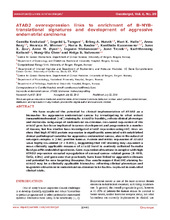| dc.contributor.author | Krakstad, Camilla | en_US |
| dc.contributor.author | Tangen, Ingvild Løberg | en_US |
| dc.contributor.author | Høivik, Erling Andre | en_US |
| dc.contributor.author | Halle, Mari Kyllesø | en_US |
| dc.contributor.author | Berg, Anna | en_US |
| dc.contributor.author | Werner, Henrica Maria Johanna | en_US |
| dc.contributor.author | Ræder, Maria B. | en_US |
| dc.contributor.author | Kusonmano, Kanthida | en_US |
| dc.contributor.author | Zou, June | en_US |
| dc.contributor.author | Øyan, Anne Margrete | en_US |
| dc.contributor.author | Stefansson, Ingunn | en_US |
| dc.contributor.author | Trovik, Jone | en_US |
| dc.contributor.author | Kalland, Karl-Henning | en_US |
| dc.contributor.author | Chen, Hong-Wu | en_US |
| dc.contributor.author | Salvesen, Helga Birgitte | en_US |
| dc.date.accessioned | 2016-01-11T09:57:13Z | |
| dc.date.available | 2016-01-11T09:57:13Z | |
| dc.date.issued | 2015 | |
| dc.Published | OncoTarget 2015, 6(29):28440-28452 | eng |
| dc.identifier.issn | 1949-2553 | |
| dc.identifier.uri | https://hdl.handle.net/1956/10913 | |
| dc.description.abstract | We have explored the potential for clinical implementation of ATAD2 as a biomarker for aggressive endometrial cancer by investigating to what extent immunohistochemical (IHC) staining for ATAD2 is feasible, reflects clinical phenotype and molecular subgroups of endometrial carcinomas. Increased expression of the ATAD2 gene has been implicated in cancer development and progression in a number of tissues, but few studies have investigated ATAD2 expression using IHC. Here we show that high ATAD2 protein expression is significantly associated with established clinical-pathological variables for aggressive endometrial cancer, also in the subset of estrogen receptor α (ERα) positive tumors. Protein and mRNA expression of ATAD2 were highly correlated (P < 0.001), suggesting that IHC staining may represent a more clinically applicable measure of ATAD2 level in routinely collected formalin fixed paraffin embedded specimens. Gene expression alterations in samples with high ATAD2 expression revealed upregulation of several cancer-related genes (B-MYB, CDCs, E2Fs) and gene sets that previously have been linked to aggressive disease and potential for new targeting therapies. Our results support that IHC staining for ATAD2 may be a clinically applicable biomarker reflecting clinical phenotype and targetable alterations in endometrial carcinomas to be further explored in controlled clinical trials. | en_US |
| dc.language.iso | eng | eng |
| dc.publisher | Impact Journals | eng |
| dc.rights | Attribution CC BY | eng |
| dc.rights.uri | http://creativecommons.org/licenses/by/3.0/ | eng |
| dc.title | ATAD2 overexpression links to enrichment of B-MYBtranslational signatures and development of aggressive endometrial carcinoma | en_US |
| dc.type | Peer reviewed | |
| dc.type | Journal article | |
| dc.date.updated | 2015-12-22T10:38:58Z | |
| dc.description.version | publishedVersion | en_US |
| dc.rights.holder | Copyright 2015 The Authors | |
| dc.identifier.doi | https://doi.org/10.18632/oncotarget.4955 | |
| dc.identifier.cristin | 1291537 | |

